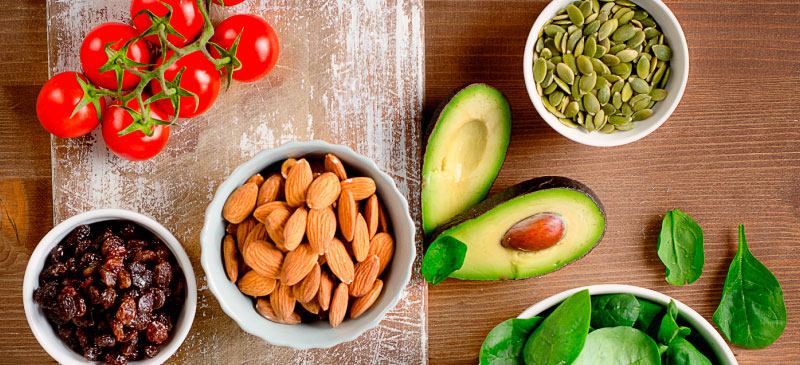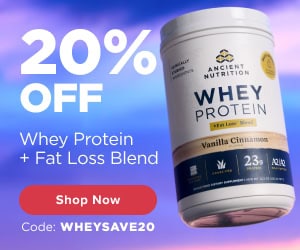This Dr. Axe content is medically reviewed or fact checked to ensure factually accurate information.
With strict editorial sourcing guidelines, we only link to academic research institutions, reputable media sites and, when research is available, medically peer-reviewed studies. Note that the numbers in parentheses (1, 2, etc.) are clickable links to these studies.
The information in our articles is NOT intended to replace a one-on-one relationship with a qualified health care professional and is not intended as medical advice.
This article is based on scientific evidence, written by experts and fact checked by our trained editorial staff. Note that the numbers in parentheses (1, 2, etc.) are clickable links to medically peer-reviewed studies.
Our team includes licensed nutritionists and dietitians, certified health education specialists, as well as certified strength and conditioning specialists, personal trainers and corrective exercise specialists. Our team aims to be not only thorough with its research, but also objective and unbiased.
The information in our articles is NOT intended to replace a one-on-one relationship with a qualified health care professional and is not intended as medical advice.
Top 15 Foods High in Potassium
July 9, 2023

There are so many reasons you need to make sure you consume an adequate amount of potassium-rich foods daily. An important electrolyte, potassium is also the third most abundant mineral in the body. It interacts with sodium to perform a number of important functions every single day, such as balancing fluids and mineral levels within the body.
It’s why having low potassium levels can be so dangerous. Symptoms of low potassium — aka hypokalemia — are dangerous and can include severe headaches, dehydration and heart palpitations.
Fortunately, foods high in potassium are not only safe and healthy but also not difficult to come by.
Here are the recommendations for potassium from the National Academies of Sciences, Engineering, and Medicine:
- 0–6 months: 400 milligrams/day
- 7–12 months: 860 milligrams/day
- 1–3 years: 2,000 milligrams/day
- 4–8 years: 2,300 milligrams/day
- 9–13 years: 2,500 milligrams/day for males and 2,300 milligrams/day for females
- 14–18 years: 3,000 milligrams/day for males and 2,300 milligrams/day for females
- Over 19 years: 3,400 milligrams/day for males and 2,600 milligrams/day for females
- Women who are pregnant or breastfeeding: 2,800–2,900 milligrams/day
In addition, athletes who work out for more than an hour most days may need even more potassium, and intakes vary based on muscle mass, activity levels, etc.
1. Avocado
1 whole: 1,067 milligrams
Avocado is definitely one of the best potassium-rich foods. A 2013 study published in the Nutrition Journal revealed epidemiological data from 2001 to 2008 that describes the effects and benefits of avocado consumption on metabolic disease risk factors.
Overall, researchers found that people who ate avocados tended to have healthier diets overall, as well as an increased nutrient intake and a decreased likelihood of developing metabolic syndrome.
2. Lima Beans
1 cup: 955 milligrams
A single serving of lima beans can knock out over one-quarter of your daily potassium needs while also supplying a steady stream of other nutrients, including protein, fiber, iron and magnesium.
Lima beans are also versatile and easy to prepare, making them an easy potassium-rich side dish to accompany any meal.
3. Swiss Chard
1 cup, cooked: 961 milligrams
As one of the top foods high in potassium, Swiss chard is incredibly versatile and delicious. Not only can it be mixed into salads along with an assortment of other greens, but it can also be sautéed or added to pasta dishes, casseroles, soups or stews to enjoy the multitude of possible potassium benefits.
4. Acorn Squash
1 cup: 896 milligrams
Acorn squash nutrition is a vegetable source of potassium that doubles as a great source of antioxidants. Most impressively are the carotenoids contained in just one serving of acorn squash.
This type of antioxidant is well-known for helping prevent and fight various types of cancer, including skin, breast, lung and prostate cancer.
5. Spinach
1 cup cooked: 839 milligrams
There’s a reason why spinach was the cartoon character Popeye’s power food of choice. Not only is spinach a potassium-rich food, but scientific research also shows that spinach contains plant chloroplast glycoglycerolipids, which are believed to act as cancer-fighting agents.

6. Sweet Potato
1 large: 855 milligrams
Sweet potatoes are one of the top foods high in potassium that contain a higher density of nutrients than white potatoes. Sweet potatoes are also high in beta-carotene, vitamin C and vitamin B6.
Plus, animal models show that sweet potatoes exhibit anti-ulcer activity and may be helpful in the successful treatment of peptic ulcers.
7. Wild-Caught Salmon
½ filet: 772 milligrams
In addition to potassium as well as other vitamins, minerals and protein, wild-caught salmon is loaded with health-promoting omega-3 fatty acids. The benefits of these essential fatty acids may include improved heart health and reduced symptoms of depression, high blood pressure, attention deficit hyperactivity disorder, joint pain and chronic skin ailments like eczema.
8. Dried Apricots
½ cup: 756 milligrams
Dried apricots provide a quick and easy way to add potassium to your diet. Epidemiological studies have actually shown that people who consume dried apricot and other dried fruits tend to have healthier overall diets with more nutrients as well as a lower body weight. In moderation, dried fruit can be a healthy and potassium-rich snack choice.
9. Pomegranate
1 whole: 667 milligrams
Pomegranates are awesome fruit sources of potassium. They’re also loaded with fiber, vitamin C and vitamin K, among other nutrients. Plus, the pomegranate also lands a spot on the list of top aphrodisiac foods due to its ability to reduce cortisol levels in the body.
Additionally, according to a study out of California, pomegranate juice was compared to several other fruit juices and was found to contain the highest concentration of polyphenols.
10. Coconut Water
1 cup: 600 milligrams
Looking for more foods high in potassium that also come in liquid form? When you select a healthy variety without added sugars, you have a great beverage option that’s high in electrolytes like potassium but not too high in sugar or calories.
Not only is it highly nutritious, but coconut water has even been used in emergency situations as an IV hydration fluid.
11. White Beans
½ cup: 502 milligrams
Not only do white beans contain a significant dose of potassium per serving, but they’re also high in fiber. Consuming fiber-rich foods like white beans helps lower your risk of diabetes and heart disease while also promoting weight control as well.
12. Banana
1 large: 487 milligrams
In addition to being a great source of potassium, bananas can help repair muscle and balance water retention as a healthy post-workout snack.
Exercising is one of the major ways that your potassium levels can get drained, which is why it’s crucial to consume potassium-rich foods like bananas after an intense gym session. Research also shows that bananas are rich in dopamine, a major mood-enhancing hormone.
13. Sardines
1 can: 365 milligrams
Packed with vitamin B12, selenium and vitamin D, sardines are a nutritious and delicious addition to any diet. Besides being one of the top foods with potassium, sardines are also loaded with omega-3 fatty acids, a type of essential fatty acid that can help relieve inflammation, promote brain health and boost overall mood.
14. Peas
1 cup: 354 milligrams
Low in calories yet high in nutrients, peas are an excellent source of potassium and several other micronutrients that your body needs. Peas also contain a concentrated amount of antioxidants and polyphenols, which are thought to be responsible for their cancer-fighting, cholesterol-lowering properties.
15. Beets
1/2 cup: 259 milligrams
Adding a serving of beets to your diet is an easy way to take advantage of the plethora of potential potassium benefits. Beets are also high in dietary nitrates, which act as a vasodilator to help reduce blood pressure and support overall heart health.
Final Thoughts
- Hopefully, this list of foods high in potassium will help you to see that bananas aren’t your only option when it comes to getting your daily dose of potassium.
- There are actually many fruits and vegetables, and even fish, that rank even higher than bananas when it comes to their content of this vital mineral.
- There are so many delicious potassium-rich foods that can be eaten alone or in healthy recipes, which makes it easy not to fall short in the potassium department.






